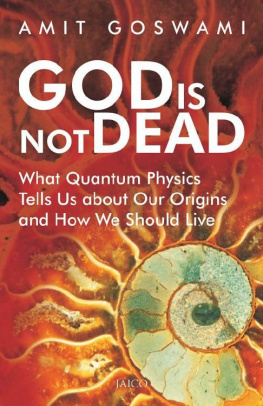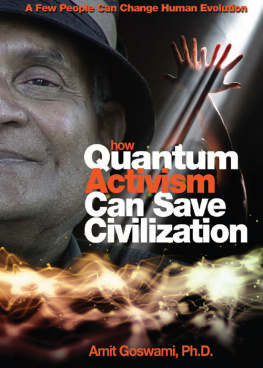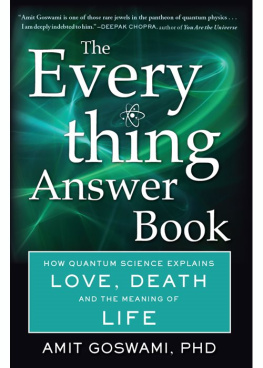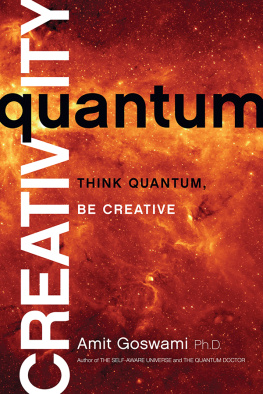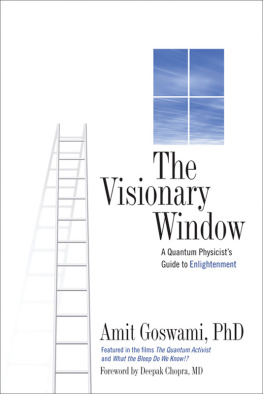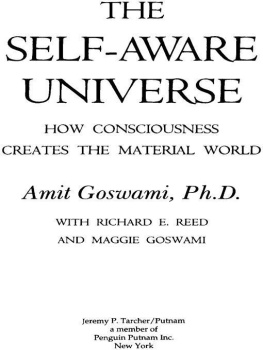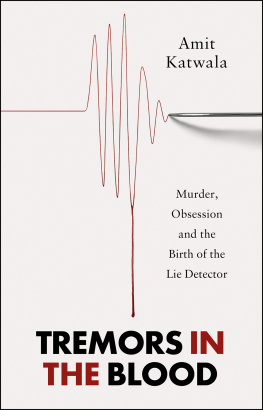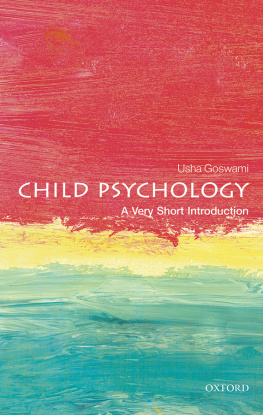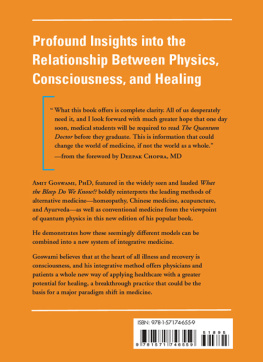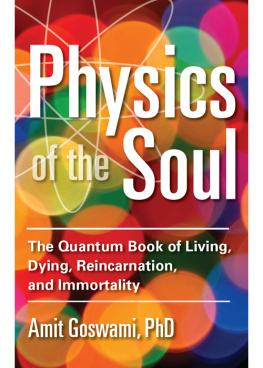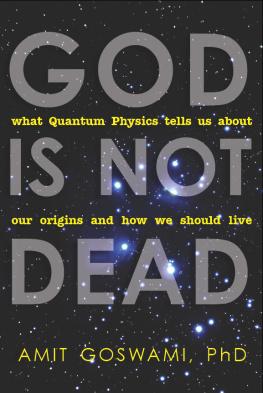GOD IS
NOT DEAD
What Quantum Physics
Tells Us about Our Origins
and How We Should Live
AMIT GOSWAMI
JAICO PUBLISHING HOUSE
Ahmedabad Bangalore Bhopal Bhubaneswar Chennai
Delhi Hyderabad Kolkata Lucknow Mumbai
Published by Jaico Publishing House
A-2 Jash Chambers, 7-A Sir Phirozshah Mehta Road
Fort, Mumbai - 400 001
www.jaicobooks.com
Amit Goswami
Original English language edition published by
Hampton Roads Publishing Company.
English-language reprint for the Indian subcontinent edition.
All rights reserved.
GOD IS NOT DEAD
ISBN 978-81-7992-992-6
First Jaico Impression: 2009
Sixth Jaico Impression: 2011
No part of this book may be reproduced or utilized in
any form or by any means, electronic or
mechanical including photocopying, recording or by any
information storage and retrieval system,
without permission in writing from the publishers.
Printed by
Snehesh Printers
320-A, Shah & Nahar Ind. Est. A-1
Lower Parel, Mumbai - 400 013.
Contents
Preface
C an the question of God's existence be settled by scientific evidence? In this book, I show that it can and it already has, in God's favor. But the evidence is subtle, based on the concept of the primacy of consciousness from quantum physics, which remains Greek to many people, and so the message is very slow to penetrate both scientific and popular consciousness. This book attempts to accelerate the acceptance of God once again in our society and our culture.
One question needs to be settled at the outset. What is the "God" that science is rediscovering? Everyone knows that even religious people who talk the most about God cannot agree about what God is. So, is science rediscovering a Christian God, a Hindu God, a Moslem God, a Buddhist God, a Judaic God, or a God of a less popular religion? The answer is crucial.
What almost everyone doesn't know is that at the esoteric core of all the great religions, there is much agreement about the nature of God. Even at the popular level, most religions agree about three fundamental aspects of God. First, God is an agent of causation, over and above causation arising from the material world. Second, there are more subtle levels of reality than the material level. And third, there are Godlike qualitieslove is a primary onethat religions teach people to aspire to as a major goal. What is the God that science is rediscovering? Suffice it to say for now that the God rediscovered by science has all three of these important aspects.
I offer two kinds of scientific evidence for God.
The first kind I label as "the quantum signatures of the divine." Quantum physics gives us such novel aspects of realitythe quantum signaturesthat to understand, explain, and appreciate them, we are forced to introduce the God hypothesis. An example is quantum nonlocality: signal-less communication. Ordinary local communication is carried out via signals carrying energy. But in 1982, Alain Aspect and his collaborators verified in the laboratory the existence of communications requiring no signals. Hitherto, the belief was that such quantum signatures occur only in the submicroscopic world of matter and somehow are not important for the macro domain, or mundane level of reality. But I demonstrate that these quantum signatures also occur at this level, and that they provide indisputable evidence for the existence of God. Research groups conducting experiments with several kinds of phenomena have found such evidence in the laboratory.
The second kind of evidence involves what religions call subtle domains of reality. You could very easily label this kind of evidence as pertaining to impossible problems requiring impossible solutions (from the materialist point of view, that is).
An example will make this clear. Recently, there has been a lot of controversy about creationism-intelligent design theories versus evolutionism. Why so much controversy? It is because even after 150 years of Darwinism, evolutionists do not have a foolproof theory. They cannot satisfactorily explain either the fossil data, especially the fossil gaps, or why and how life appears to be so intelligently designed. This is what creates room for controversy. Honest, unprejudiced scientific appraisal of these theories and data shows what follows.
Neither Darwinism nor its later synthesis with genetics and population biology called neo-Darwinism agrees with all the experimental data.
Creationism and intelligent design theories as proposed have little scientific content, with creationism having hardly any scientific content, but there is indisputable data supporting the fundamental ideas of both evolution and intelligent design (although not Bible-based creationism).
The key here is to ask, is there an alternative to both of these approaches that agrees with all the data? My answer is yes, and I will demonstrate it in this book. But this requires the existence of a causally empowered God and a subtle body that acts as a blueprint for biological form; materialism permits neither of these. Nevertheless, impossible problems require impossible solutions!
Another example involves the processing of meaning. The philosopher John Searle and the physicist Roger Penrose have shown that computers can process only symbols, not the meaning that the symbols may represent. For generating and processing meaning, we need the mind. But then the question arises: How does mind interact with matter? The age-old dualism problem of the mind-body interaction still haunts us. This is where I show that the God hypothesis is essential to settle the mind-body interaction problem. And in this new "impossible" context, our creative ability to process new meaning gives us much tangible scientific evidence for the existence of God.
If the good news is that such evidence for God is already here, then what should we do about it? Well, first we must reformulate our sciences within the quantum God hypothesis and demonstrate its usefulness outside of quantum physics. In this book, I demonstrate that this one hypothesis solves all the hitherto unsolved mysteries of biology: the nature and origin of life, fossil gaps of evolution, why evolution proceeds from simple to complex systems, and why biological beings have feeling and mysteriously consciousness, just to mention a few. We also find that within the quantum God hypothesis, the "depth" psychology of Sigmund Freud, Carl Jung, and James Hillman, based on the unconscious, is seen as quite complementary to the "height" psychology of the humanists and transpersonalists of recent timesCarl Rogers, Roberto Assagioli, Abraham Maslow, and Ken Wilberbased on transcendence or super-consciousness. Both these psychologies are now recognized as defining paths to the realization of God in our personal lives.
There are other aspects of the quantum God hypothesis that every one of us can appreciate and even bring to fruition. This new science validates our current preoccupation with meaning, although the materialist worldview is doing its best to undermine it. Equally important is that a God-based science puts ethics and values where they belong, at the centers of our lives and societies.
We may not like some aspects of the old religions that hitherto were the only proponents of the concept of God, but we can agree that all religions gave us ethics and values (the cultivation of Godliness) for our societies. These have been undermined by the current materialist worldview, with devastating results for our politics, economics, businesses, and education. With the scientific rediscovery of God, which also emphasizes ethics and values, we gain an opportunity to revitalize modern social systems like democracy and capitalism that seem to have become bogged down with seemingly insurmountable difficulties.




